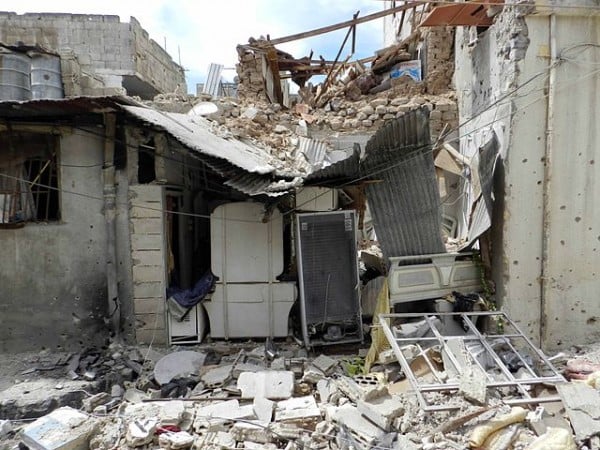
Credit: Bo yaser
By Aryeh Neier
There are no good alternatives. There seems no prospect that anything significant will come of the peace talks in Geneva. The government of President Bashar al-Assad considers that it is winning and, therefore, it is unwilling to agree to leave power or even to make meaningful concessions. Moreover, many of Assad’s supporters have a life or death interest in keeping him in power. As Alawites, or as members of other minorities in Syria that have backed Assad, many probably fear that they would be slaughtered en masse if the opposition comes to power.
The opposition groups represented at Geneva are also not able to yield on any significant issues in the interest of making peace. They cannot speak for many of those engaged in combat against the regime. In the near term, Assad and his forces are unlikely to wipe out the armed groups combating the regime and it appears increasingly unlikely that opposition forces will topple the regime. The only realistic prospect is that the horrendous war will continue and the number of those killed, maimed, infected by disease, displaced and forced to flee the country will continue to grow. The war has produced the worst humanitarian crisis of our time. No end appears in sight.
In the early days of the war in Syria, there were some in the United States and elsewhere who favored intervention in support of those seeking to oust Assad. Over time, however, as Islamist forces, including elements linked to al-Qaeda, took a leading role in fighting the Syrian regime, those voices fell silent. Some opposition forces have themselves committed severe abuses. As evil as the Assad regime is, it has largely confined itself to oppressing the people of Syria. Many now fear that an al-Qaeda linked regime could be as oppressive in Syria and also a menace internationally. Some of those fighting against Assad seem worthy of support, but it is virtually impossible to ensure that military assistance to them would not end up benefiting the more objectionable forces seeking to oust Assad.
The arguments against military intervention appear to be insurmountable. It would only be feasible through the use of military force on a large scale. There is no value to limiting military intervention to a quick strike. A large military presence would have to be maintained for an extended period. It is impossible to predict how long it would endure and how it would end. Given Russia’s veto power in the United Nations Security Council, military intervention could not take place under the world body’s auspices. Lacking the legitimacy that comes from U.N. sponsorship would make it all the more difficult to persuade governments to furnish troops even if the prospects were more predictable and if they had not been exhausted by involvement in Afghanistan, Iraq and Libya. In other such situations, as when NATO intervened successfully in Kosovo a decade and a half ago, American leadership has been required. Yet, President Barack Obama, who is eager to end America’s involvement in wars in Muslim states, would strenuously resist any proposal to send American troops to Syria. Even if the President were persuaded to support military intervention, it would be anathema to members of Congress. Many more obstacles could be cited.
In circumstances in which passivity seems intolerable and military intervention seems impossible, an approach that should be considered would be for the United States to assemble like-minded countries that are perplexed and distressed by the situation in Syria to discuss what is to be done. Such a meeting should not be held under the auspices of the United Nations as that would require inclusion of Russia in the discussion. Certainly, Russia would have to be involved at some stage if and when a proposed course of action has been developed. For the time being, however, any ally of the brutal Assad regime should be excluded as should any backer of the radical Islamist forces participating in the effort to overthrow Assad.
The agenda for such a meeting would include many matters. Among them would be protecting civilians against attacks; holding accountable those on all sides who have committed war crimes and crimes against humanity; ensuring that adequate humanitarian assistance is available to victims of the conflict inside and outside of Syria; burden-sharing with respect to refugees from Syria; limiting the spread of the conflict; and, of course, any ideas about how to end the fighting.
Would anything of value come from a meeting like this? It is hard to say. Yet it seems preferable to opting for a policy of passivity by default.
Aryeh Neier is president emeritus of Open Society Foundations.